M&Ms: Asset Stack
Pulling from your re-usable assets in the 93rd edition.
Hey Team,
I had a call to help an online friend last week, and I told him nobody walks this earth doing nothing for decades on end.
I told him, I know you've been up to something. And yet you chose not to share that. You decide not to write about it, teach it, build on top of it, or leverage it to get yourself ahead.
Instead, probably like when I started, you chose to share the thing you just learned about yesterday.
I told him, I know for you, that thing is AI and writing online. It's exciting and cool, so you can't help yourself. I know the feeling; trust me.
But it's also selfish of you to talk about those things all the time.
I told him, I know you don't know shit about those things yet, and so when you talk to me about them, I have to double-check what you're saying. And not just me, everyone else you talk to about it too. I told him, I am not trying to be rude, but you're giving us homework to do every time you share that. We always need to double-check and trust me, I am done doing homework, so I have to ignore it.
I said to him flat out, "Look, Peter, all anybody gives a shit about is what you can do for them, how you can help them. Then and only after you've done something for them will they consider doing something for you."
So the selfless thing to do would be for you to teach me, and others like me, from your decade of coding experience, your startup experience, and the eCommerce experience. Do something for us. Do the thing you've been up to in the last decade for us. Your asset stack of things you can use to help people like me is deep, and yet you chose to share the thing you learned about yesterday. I get it; maybe the old thing feels, you know, old and crusty and useless compared to where you want to go next.
But your first-hand stories are intriguing, helpful, and incredibly useful to people like me. I am still writing some code from time to time.
Benjamin Franklin said, "it is hard for an empty sack to stand upright," so why do you keep reaching into an empty sack to share? When you have a perfectly good, upright, and full sack of assets to pull from.
I said, "look, Peter, your distributed systems experiences, full stack development, learning new domains, now that's a sack so full that you could share from that and I couldn't kick it down if I wanted to."
"And if you pull something out of that sack and share it with me, then I will pull something out of this online writing sack and collaborate with you. I will help you get experience with the thing you are excited about."
I learned about this idea of pulling from a reusable Asset Stack in Small Bets. In fact, making a list of your Asset Stack is one of the first assignments from Small Bets. And it's changed the way I view building audiences and making money online.
An Asset Stack is like a sack full of the things we've been up to, know well, and can quickly establish credibility in because we've done them.
An asset from the Asset Stack is the thing we can use to help someone and then maybe ask them to help us in exchange.
For example, last year was my first year as an entrepreneur, and all I wanted to talk about was entrepreneurship. But, like my friend Peter talking about writing online without much experience, I didn't know much about entrepreneurship just yet. After I learned about this idea of an Asset Stack and establishing credibility, I also started talking about Engineering and Engineering leadership, things I was good at and had been up to for over a decade. And I wrote essays and threads helping engineers get promoted and climb the corporate ladder—something I've done very successfully in big companies and startups.
Helping others from that asset stack led to my first successful hit as an entrepreneur. And a $100k in online income from a few small bets for 2022. And most importantly, I got lots of support from engineers who were helped and got promoted, thanks to my advice.
And look, I get it; we've all got different asset stacks. But whether you've been a parent for a decade, or playing video games, you are experienced in something. So don't ignore that; use that to help people, and in exchange, they might just help you back.
I'll leave you with what I left Peter with:
"You care about what you care about—learning these new things and having people pay attention to you while you do that.
Everyone else cares about what they care about; mostly, they care about the things you know well, but now you feel are too old and crusty for you to share.
Unless you can reconcile those things, it will be hard to get what you want quickly."
Three Tweets: Google, Ideas, AI
Fortunes can turn seemingly overnight.
Google had a bad demo of their AI platform this week, Bard. The competitor to ChatGPT.
They cut the demo short mid-stream because Bard gave factually incorrect answers. Showcasing how risk-averse they are.
Their stock took a huge hit last week because ChatGPT has reached 100m users in a couple of months, in a record-breaking time. And Bing search, thanks to that tech, is a real contender for the first time ever.
And Satya Nadella and Microsoft are throwing additional salt in the wound; Satya declared this week that Bing does not need to generate a profit, unlike Google, whose main business is search. Bing just needs to break even and so they can afford to scale ChatGPT and OpenAI because they make plenty of money in other places.
Internally, the Bard move is being called “un-Googely”:
It’s ironic that it’s that risk aversion why they find themselves flat footed.
Of course, Google is a sleeping giant and I think this is far from over. I think we as consumers will win big from the fierce competition that’s to come.
Marc, the co-founder of Netflix, has been dropping some incredible common sense knowledge on Twitter.
It's only by colliding ideas with the real world that we find out if they are any good. In our own heads, everything sounds good.
Many people will harbor bad ideas their entire lives simply because they won't bother to share them with the world.
I love this Tweet by Mustafa because it highlights something important, there are tons of startups trying to do AI right now.
But I believe that AI will be a fantastic thing for its consumers, but it will be horrible for business owners.
Airlines were great for consumers, but net as an industry, counting bankruptcies, they lost money since their inception. And Car companies are the same; nobody got super wealthy in cars. And nobody got super wealthy in telecom either; AT&T and others got killed before the internet, and as an industry, they actually lost money. The internet spoiled the business world, but not every new tech will behave like the internet.
In this single Tweet, we can see that it will kill off tons and tons of services we have to pay for. But it's not like those Grammarly subscription fees will go to Microsoft and ChatGPT.
And we already know that Microsoft will have fierce competition, just like airlines and car companies had. Google, Microsoft, and the rest of Big Tech will likely jump in. That fierce competition will cause competitors in the space to fight to the end in this deeply important area.
Of course, all of this is a lot of speculation, and it's tough to say for sure.
But I believe we, as consumers of AI, will likely win big. Many, like Mustafa, already are.
Two Memes: The Backpack, Easy, Branded Tech
This tweet is funny because this week, it was reported that Sam Altman, the CEO of OpenAI that invented ChatGPT, is a Doomsday prepper.
As a side note, Doomsday prepping gets a bad rep, but some preparation for the worst case is not as crazy as it sounds.
It’s, in fact, quite rational to at least prepare a little bit for the worst-case scenario and have some peace of mind knowing you did something.
Ironically this is probably why Elon bought Twitter, he thought it would be easy.
But also, as an Engineer I can relate to signing up for things I thought would be easy.
This was a fun clip to watch. And I unfortunately suspect that Adam Neumann’s pitch might’ve been fine in the easy money era but he might be in for some tough times in the post easy money era.
As always, thank you for reading!
-Louie
P.S. you can reply to this email; it will get to me, and I will read it.




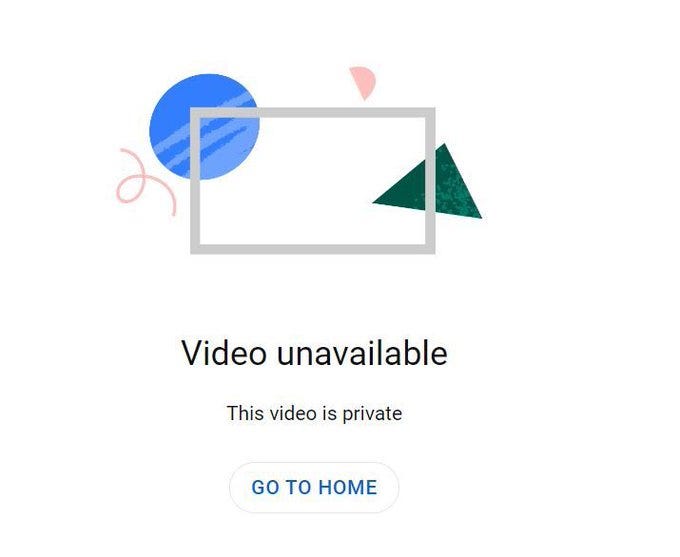
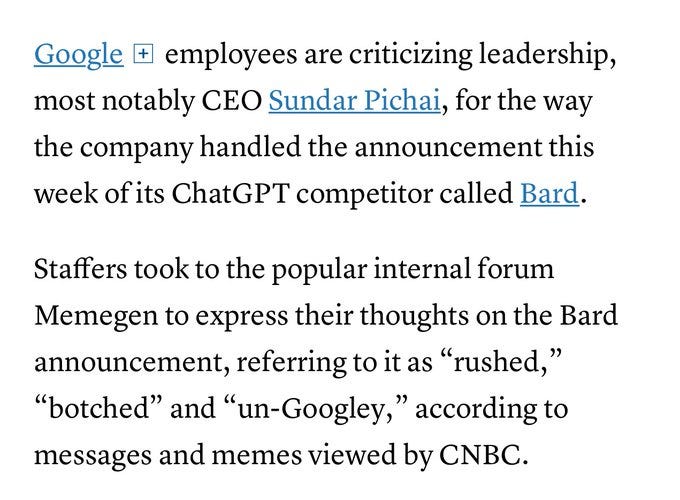

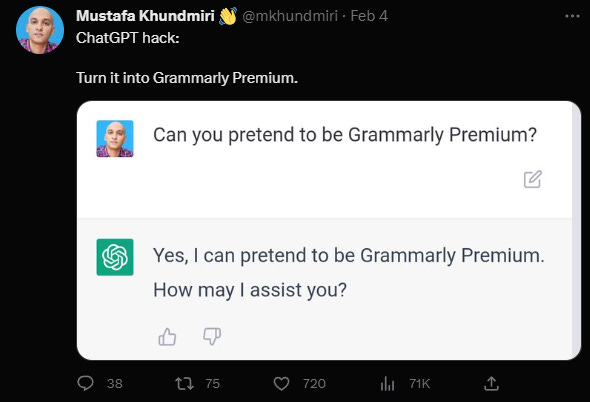
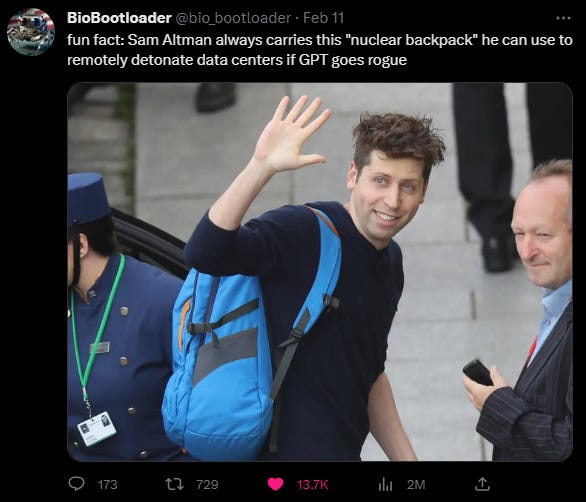
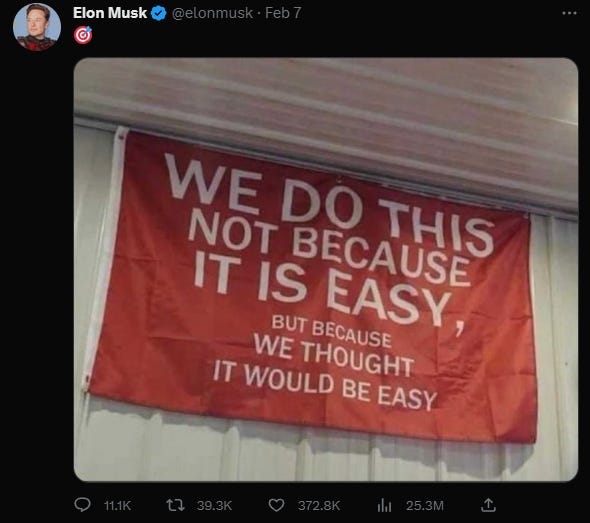
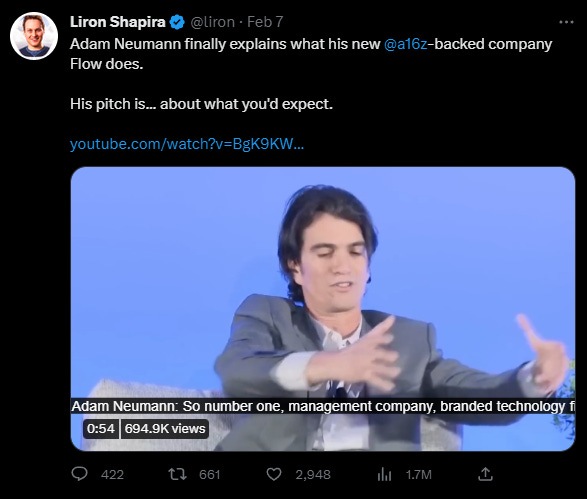
Agree on the importance of your knowledge in public. Even I used to underestimate this. Imposter syndrome used to creep in. But as soon I just thought of it as documenting my journey/learnings and seeing how it could help others, the whole perception changed.
Building audience is the natural byproduct of helping people on internet ✨
I feel I burnt myself in the Advice Business.
Unlike Peter, I conquered the thoughts that my advice is "old" and wrote a short book on building portfolio projects that get you hired.
Someone posted a short blog post (https://akoskm.com/how-to-stand-out-with-your-job-application) version of this book on HN (https://news.ycombinator.com/item?id=29569814), receiving incredibly negative responses and seen as bad advice. Of course, I read through all of them, and I had several conclusions:
- if you list step-by-step what worked for you, some might say it worked for your special case (my contained example for building projects, not just the theory)
- if you give too broad advice, it's either too obvious or too generic
Although the Advice Business seems like a great idea, without a social solid proof (like working for big tech), it is less attainable for us, ordinary fullstack engineers who only worked for Upwork clients and local outsourcing companies.